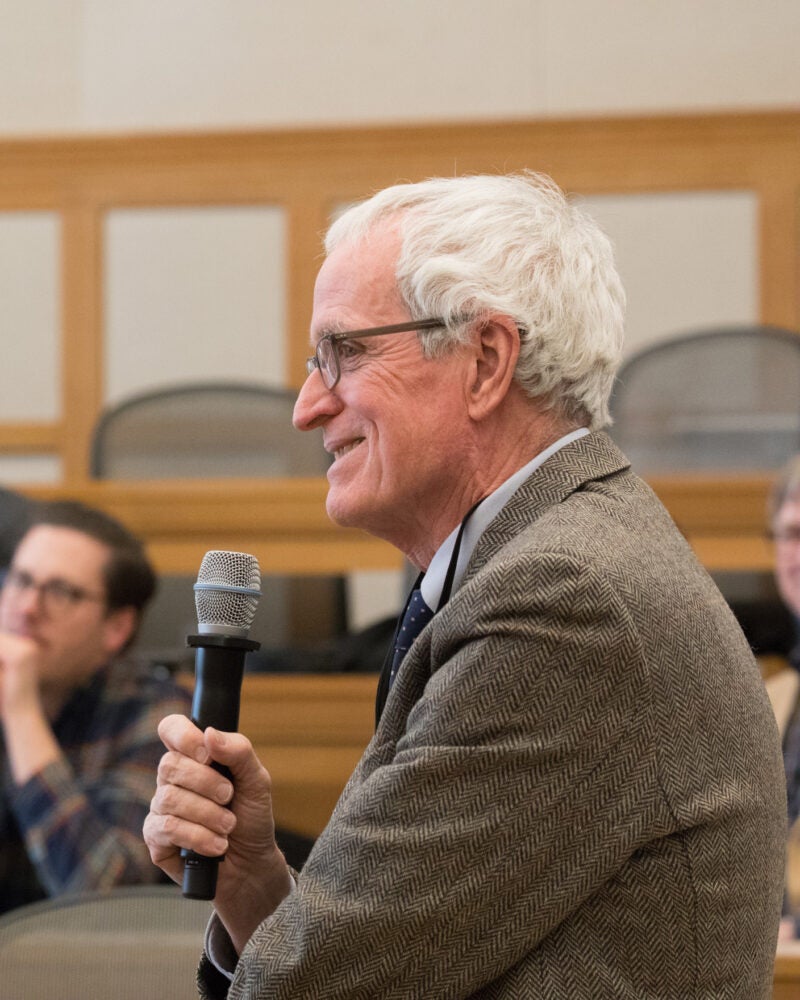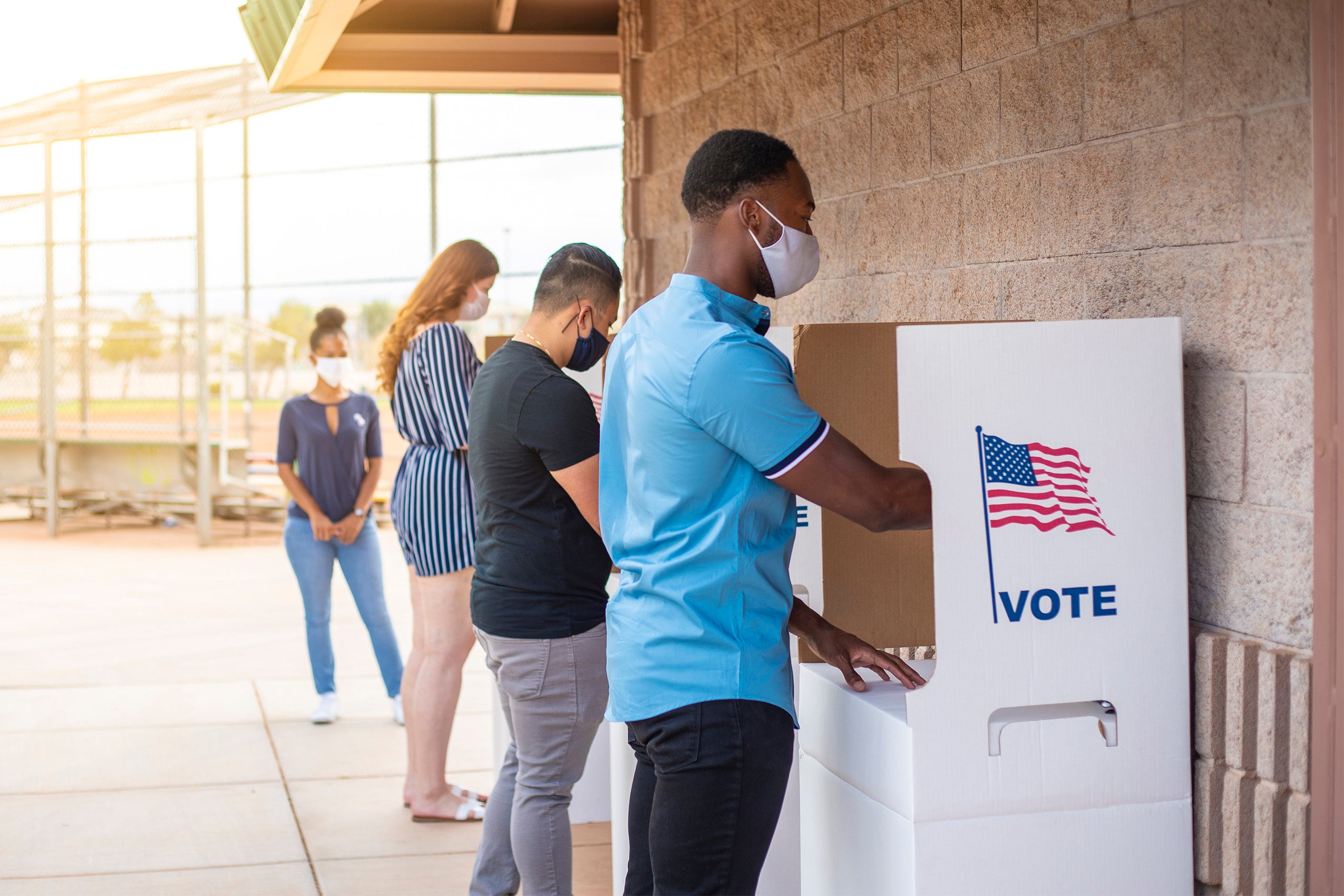People
Peter Brann
-
Ranked-choice voting, explained
October 26, 2020
On Nov. 3, voters in Massachusetts and Alaska will have the opportunity to adopt ranked-choice voting (RCV) statewide. HLS Lecturer Peter Brann argues that Maine has led the nation in adopting the system that better ensures that the most popular candidate in any election wins.
-
On Tuesday morning, Merlene Sanborn was at work on an alteration at her small stitchery. Near her sewing machine, a radio was playing an endless stream of campaign ads from both Sen. Susan Collins and her Democratic challenger, Sara Gideon. Sanborn said she has supported Collins in the past, but this election cycle seems different. “There’s such an atmosphere of disrespect in the campaigning,” she told me, flicking off the station. “I feel like both candidates have forgotten about what matters to Maine.” Chief among those issues, she said, are financial opportunities for small-business owners and access to health care. She said she is worried the Supreme Court will rule in ways that jeopardize both, which is why the death of Justice Ruth Bader Ginsburg on Friday and the fight over how quickly to fill her vacancy has suddenly become an issue of consequence in a part of Maine that will play an important role in deciding the reelection of both Collins and President Donald Trump...Peter Brann is a practicing attorney in the state and a visiting lecturer at Harvard Law School. He represented Golden in the 2018 Poliquin suit. He said the prospect of Collins appealing to the Supreme Court is possible, but the court would probably agree to hear the case only if a lower court was divided in its ruling or if enough justices see ranked-choice voting as a potential infringement of voters’ equal protection. Collins’ office did not respond to questions about whether she would appeal November’s election results if she lost. Regardless, Brann said, he’s hopeful that decision will stand and there will be no further Republican attempts to challenge it at any level—and particularly not at the Supreme Court. “Constitutional arguments aren’t like wine,” he said. “They don’t improve with age.”
-
Maine Supreme Court decision paves way for ranked choice in presidential election
September 23, 2020
A people's veto to repeal ranked choice voting will not appear on the November ballot, after a decision by the Maine Supreme Court on Tuesday. In a 24-page decision, justices overturned a lower court ruling and upheld the Maine Secretary of State's determination that organizers did not have enough signatures to make the ballot. The arguments focused on nearly 1,000 signatures that were collected by two circulators who weren’t registered Maine voters at the time, in the city or town where they lived. Secretary of State Matt Dunlap argued that violated the law and invalidated those signatures. Peter Brann, an attorney in Lewiston and adjunct professor at Harvard Law School, says the court decision itself is about a technical election issue, but it has big implications. It means Maine will be the first state to use ranked choice voting in a presidential election. It will also be used once again in Congressional races. In a statement, the chair of Maine’s Republican Party said, "We are disappointed in the decision and exploring further options for review by the federal courts to protect Maine voters’ rights to be heard." "It has a little bit of a feel of Charlie Brown and the football, where every two years someone's taking another run at it," Brann said. Unless someone makes another attempt at gathering signatures, he believes the court decision marks the end of this particular fight. "Each time it's gone to the ballot, it's won pretty easily," Brann said.
-
An article by Peter Brann and James Tierney: Last Friday, the partisan leadership at the U.S. Department of Justice in Washington claimed that it knew better than Gov. Mills what should be done in Maine in the COVID-19 pandemic. They argued to a federal court in Maine that Gov. Mills’ emergency order mandating a 14-day self-quarantine for out-of-state visitors was unconstitutional (which is rich irony, given that they have also argued in favor of banning altogether persons in affected countries from even entering the country to slow the virus’ spread). Later the same day, U.S. District Judge Lance Walker rebuffed their efforts, finding: “The governor’s executive orders are informed by a desire to preserve public health in the face of a pandemic. Striking down the quarantine order would seriously undermine her efforts and, based on the current record, would effectively disregard the balance of powers established by our federal system.” The decision is preliminary, and so there is little doubt that the Justice Department will press its arguments, safe in the knowledge that they will not have to suffer the consequences if our parents, children and neighbors are infected by asymptomatic out-of-staters coming to Maine. If today’s Justice Department had only considered its own prior actions, it would know better.
-
The Constitution is not a suicide pact
May 28, 2020
An article by Peter Brann and James Tierney: Maine is not immune from a virus that knows no borders as it sweeps across the world, stealing the lives of loved ones. To keep ourselves safe, we have also lost many of the things we hold dear, such as graduations, summer fairs and family get-togethers. To combat this plague, Gov. Janet Mills has invoked emergency powers to protect the health and safety of all Mainers. Every state governor has always had extensive emergency powers, and when they are invoked following hurricanes, tornados and other disasters, no one blinks an eye. Now we face the largest worldwide pandemic in more than a century, which has killed nearly 100,000 people in the United States and sickened more than 1,670,000 people in the United States (and more than 5,500,000 worldwide). A small minority nonetheless have gone to court to claim that Mills is violating their constitutional right to do whatever they want whenever they want, effectively claiming a constitutional right to endanger the rest of us. These lawsuits lack merit and mangle our national heritage. In the debate over whether to send troops to fight the Revolutionary War, Patrick Henry famously said, “Give me liberty or give me death!” Unfortunately, the critics challenging Mills’ emergency orders fighting the COVID-19 pandemic essentially misquote Henry, arguing instead, “Give me liberty and give me death!” Fortunately, the Constitution strikes a different balance.
-
Why Maine’s Ranked-Choice Voting Could Go National
December 5, 2019
An article by Peter Brann: For many years, Maine’s gubernatorial election was held in the September of presidential election years. That made it a bellwether for the subsequent presidential election two months later — leading to the phrase, “As Maine goes, so goes the nation.” Maine no longer conducts its gubernatorial election in September or even in presidential years. But Maine has taken the lead in a new way. In 2018, Maine became the first state in the country to conduct federal congressional elections using ranked-choice voting. Our experience shows that voters can and will embrace new ways of conducting elections, which could help improve voter turnout. Indeed, Maine saw more than 47 percent of its eligible voters cast ballots in the first general election using ranked-choice voting — a half-century high for midterm elections and substantially higher than the national average.
-
Jared Golden’s lawyer calls Bruce Poliquin suit ‘sour grapes’
November 30, 2018
An effort to seek a new election in Maine’s 2nd Congressional District race is an “extraordinary attempt to overturn the results of a fair and free election,” an attorney for U.S. Rep.-elect Jared Golden said in a legal filing late Wednesday. Peter Brann, the lawyer for the Lewiston Democrat, said the request by U.S. Rep. Bruce Poliquin to overturn the ranked-choice voting results is unlikely to prevail and ought to be rejected. “Golden won the election fair and square,” Brann said in legal papers filed with the U.S. District Court in Bangor. “Poliquin’s sour grapes preliminary injunction is too little, too late, and is outweighed by the injury to the thousands of Maine voters who selected Golden over Poliquin and who would be disenfranchised by Poliquin’s attempt to use the courts to overturn the results of the election,” said Brann, a Lewiston attorney.

